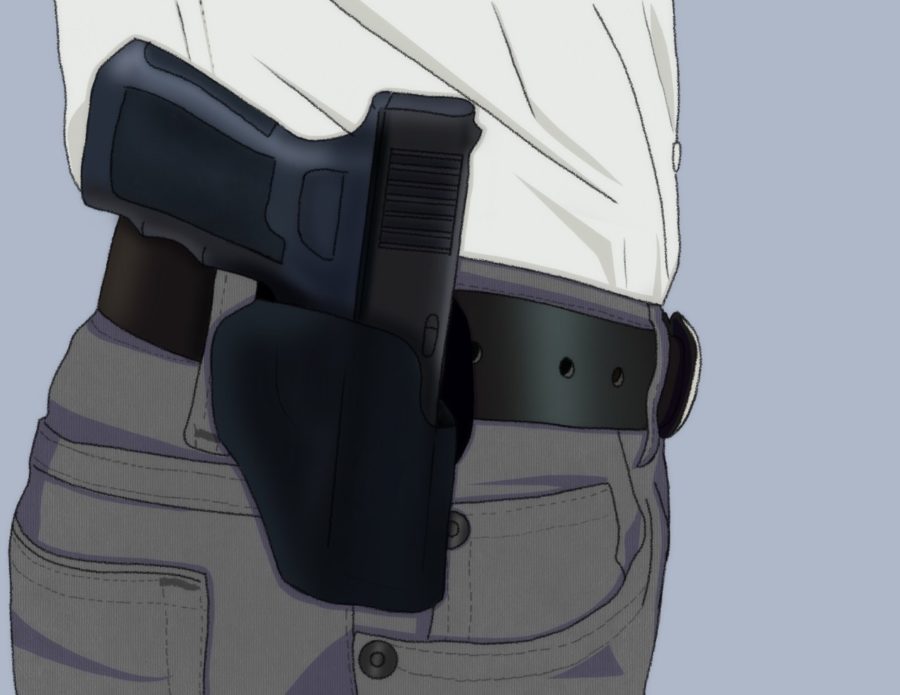Carnegie staff and students voice opinion on open carry law
Artwork by Vivian Huynh
Texas’ new open carry law went into effect September 1, allowing gun owners 21 years and older without license and training to carry firearms in public.
September 30, 2021
On Sept. 1st, Governor Greg Abbott’s open carry law went into effect across Texas.
The law allows individuals 21 years and older to carry handguns in public places without a license or training. It does not apply to people with felonies, domestic violence charges, or those who may be dangerous. Furthermore, permitless carry is not allowed in polling places during voting processes, government meetings and offices, and university campuses.
Although public schools are also exempt from this law, the loosening of gun restrictions is in context of the history of gun violence in Texas schools. The state ranks number two in most school shootings in the country, with some HISD campuses, such as Bellaire High School, having experienced gun violence in recent years.
“I’m not really sure that the solution is more guns,” senior Simon Henry said.
In a survey conducted by the University of Texas/Texas Tribune, 39% of the 1,200 registered voters polled thought that more guns being carried would make the country less safe, while a smaller 34% thought it would increase safety. Additionally, the same survey found that 59% were opposed to unlicensed handgun carry.
“I’ve never fully understood the logic behind it,” Henry said. “Permitless carry allows someone to carry a firearm without the necessary training.”
Prior to this law, individuals needed a License to Carry (LTC) their handgun in public. It was mandatory for applicants to register fingerprints. They also needed four to six hours of training and a passing score on both a written exam and shoot proficiency test.
“I think that a lot of people have this romanticized image in their head of how they’re going to stop the bad guy, and they’re going to go in there, guns blazing, but the fact is that they’re idiots,” history teacher Nathan Wendt said. “They’re going to probably hurt a lot more people than cause good.”
There has already been other legislation in Texas that aims to increase safety by allowing looser gun control, as seen by the 2019 bill that expanded school marshall programs (trained adults who can carry guns in schools). Another gun-related law being discussed would allow teachers concealed carry of handguns, but it hasn’t progressed.
“While the idea is there that potentially somebody could stop an armed intrusion from occurring, that’s the whole reason that we have officers here doing that,” Wendt said.
Future laws aside, the current permitless carry law has caused some students to express feeling uneasy about being in public. Although the law does not apply to governmental and some educational locations, the law’s risk is not completely eliminated.
“When we go back and start transitioning back to normal, and we’re in more public places, especially places like protests, or like Black Lives Matter protests or even Pride, I would feel a lot more nervous because I know that anyone could just pull out their hand gun,” sophomore Bela Jotwani said.
These concerns stem from the already disproportionately high gun violence against minorities. African Americans are subject to 10 times the gun homicides. Additionally, they are 18 times more likely to experience gun assault injuries.
“I will definitely have to be a little bit more on guard,” Henry said. “You see stories in the news about people getting gunned down for doing almost anything, and I would say as an African American, I especially need to be on guard.”
However, due to the exclusion of schools in this law, it has not changed how safe some CVHS students feel on campus.
“There definitely haven’t been any major changes, because our school is very small and very liberal. It’s not known to have anything similar to that happening. We don’t even have any fights,” Jotwani said.
Regardless of the possible conflicts that may arise, there are different views about how this law will affect others. While some feel the law will be challenged, others think it will set a precedent for less restrictive gun laws.
“I think that there’s probably going to be a lot of reform laws, maybe five maybe ten years down the line from this, that are really going to hammer down on the people who use their weapon in an unlawful way,” Wendt said.
On the contrary, Jotwani believes the law will do the opposite.
“I think this will affect our society and communities by making them feel less safe and making more guns around more normal by normalizing the use and carrying of guns. And in a normal situation, this will definitely cause some discomfort at first, but like most laws, a lot of the time people get used to it and then more shootings happen, but people get used to it, and then society just moves on,” Jotwani said.
Texas is already steeped in the desire to uphold the Second Amendment. There was a 64% increase in background checks on firearms (required for the purchase of firearms from licensed dealers) from 2019-2020, and 2021 appears to be following this upward trend.
“Gun culture has been here. I think it’s going to stay here. It’s not going to necessarily go away,” Wendt said. “But I think what we need to do is really reemphasize safety within that culture.”
This story was originally published on Upstream News on September 28, 2021.




































